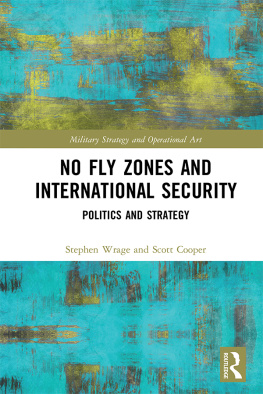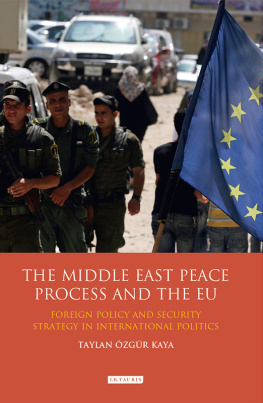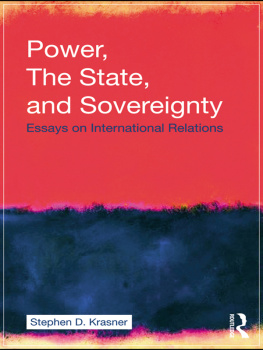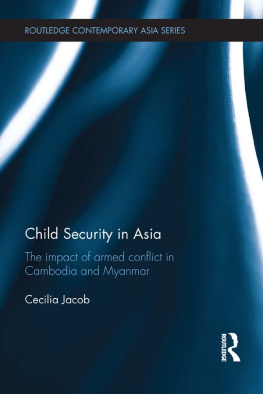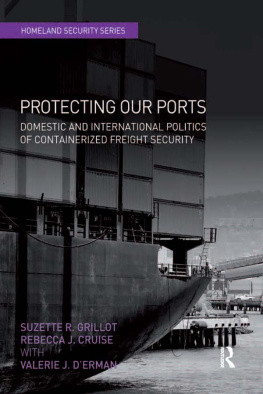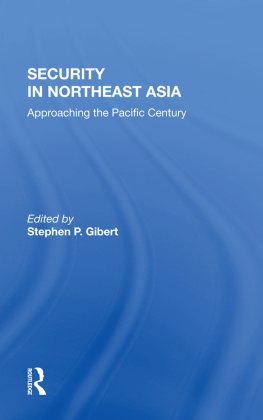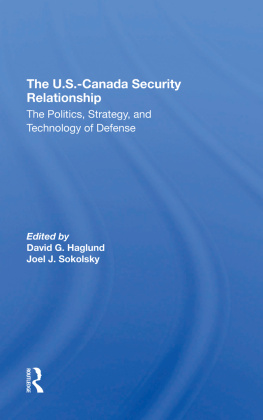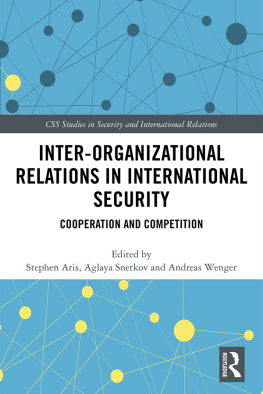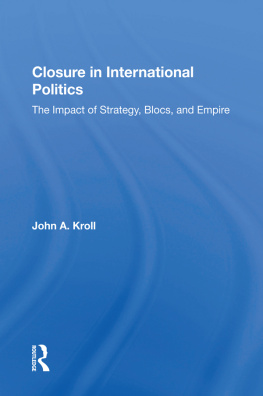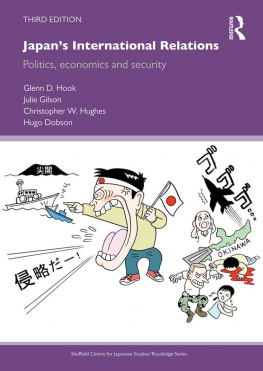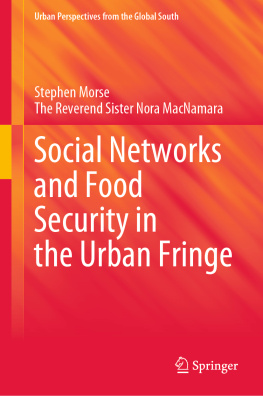No Fly Zones and International Security
This book discusses the practice of no fly zones in international affairs.
The first no fly zone was imposed over northern Iraq immediately after the first Gulf War, and since then they have become a regular recourse for policymakers confronted with humanitarian crises. They have come to be viewed as a feasible, essentially non-violent form of intervention that can be performed entirely from the air in a situation where some form of action is widely thought to be necessary, but the political will for a ground operation is insufficient. Nonetheless, even among policy makers there is limited understanding of the requirements, the shortcomings and the potentialities of no fly zones. This is the first comprehensive work on this topic, and examines the assumptions surrounding no fly zones by focusing on issues such as authority, cost, possibility of escalation and effectiveness. Looking back at 25 years of experience with no fly zones, the books goal is to look at what historical lessons may be drawn and to make some predictions with regard to the politics and strategy of no fly zones in the future.
This book will be of much interest to students of air power, security studies, Middle Eastern Studies and IR in general.
Stephen Wrage is Professor of Political Science at the US Naval Academy. He has written widely on national security affairs and authored Immaculate Warfare (2004).
Scott Cooper is a retired lieutenant colonel and has flown hundreds of no fly zone enforcement missions, including the Bosnian and Iraqi no fly zones. He is the National Security Outreach Director at Human Rights First.
Military Strategy and Operational Art
The Routledge Series on Military Strategy and Operational Art analyzes and assesses the synergistic interrelationship between joint and combined military operations, national military strategy, grand strategy, and national political objectives in peacetime, as well as during periods of armed conflict. In doing so, the series highlights how various patterns of civilmilitary relations, as well as styles of political and military leadership influence the outcome of armed conflicts. In addition, the series highlights both the advantages and challenges associated with the joint and combined use of military forces involved in humanitarian relief, nation building, and peacekeeping operations, as well as across the spectrum of conflict extending from limited conflicts fought for limited political objectives to total war fought for unlimited objectives. Finally, the series highlights the complexity and challenges associated with insurgency and counter-insurgency operations, as well as conventional operations and operations involving the possible use of weapons of mass destruction.
Edited by Professor Howard M. Hensel, Air War College, USA
The Swedish Presence in Afghanistan
Security and Defence Transformation
Edited by Arita Holmberg and Jan Hallenberg
Culture and Defence in Brazil
An Inside Look at Brazils Aerospace Strategies
Edited by Maria Filomena Fontes Ricco
The Future of US Warfare
Edited by Scott N. Romaniuk and Francis Grice
Limited War in South Asia
From Decolonization to Recent Times
Scott Gates and Kaushik Roy
No Fly Zones and International Security
Politics and Strategy
Stephen Wrage and Scott Cooper
For more information about this series, please visit: https://www.routledge.com/Military-Strategy-and-Operational-Art/book-series/MSOA
First published 2019
by Routledge
2 Park Square, Milton Park, Abingdon, Oxon OX14 4RN
and by Routledge
52 Vanderbilt Avenue, New York, NY 10017
Routledge is an imprint of the Taylor & Francis Group, an informa business
2019 Stephen Wrage and Scott Cooper
The right of Stephen Wrage and Scott Cooper to be identified as authors of this work has been asserted by them in accordance with sections 77 and 78 of the Copyright, Designs and Patents Act 1988.
All rights reserved. No part of this book may be reprinted or reproduced or utilised in any form or by any electronic, mechanical, or other means, now known or hereafter invented, including photocopying and recording, or in any information storage or retrieval system, without permission in writing from the publishers.
Trademark notice: Product or corporate names may be trademarks or registered trademarks, and are used only for identification and explanation without intent to infringe.
British Library Cataloguing-in-Publication Data
A catalogue record for this book is available from the British Library
Library of Congress Cataloging-in-Publication Data
Names: Wrage, Stephen D., author. | Cooper, Scott A., author.
Title: No fly zones and international security : politics and strategy / Stephen Wrage and Scott Cooper.
Description: First edition. | London ; New York, NY : Routledge/Taylor & Francis Group, 2019. | Series: Military strategy and operational art | Includes bibliographical references and index.
Identifiers: LCCN 2018051768 (print) | LCCN 2018052503 (ebook) | ISBN 9781317087199 (Web PDF) | ISBN 9781317087182 (ePub) | ISBN 9781317087175 (Mobi) | ISBN 9781472452313 (hardback) | ISBN 9781315598383 (e-book)
Subjects: LCSH: No-fly zones. | Humanitarian intervention. | Security, International.
Classification: LCC JZ6368 (ebook) | LCC JZ6368 .W73 2019 (print) | DDC 327.1/17dc23
LC record available at https://lccn.loc.gov/2018051768
ISBN: 978-1-4724-5231-3 (hbk)
ISBN: 978-1-315-59838-3 (ebk)
The authors would like to thank Doyle Hodges for his thoughtful, useful and insightful comments and guidance throughout the writing of the book, Mitt Regan for guidance to the literature on ethics of no fly zones, Gustav Meibauer of the London School of Economics for stimulating discussions and creative questions and Captain Sam Neill, US Coast Guard, (Ret.) and more recently of the Chairman of the Joint Chiefs of Staffs Commanders Action Group and the Office of the Chief of Staff of the Air Force for his thoughtful remarks on the strategic purposes of no fly zones.
We especially want to thank the persons who actually commanded no fly zones or were key staff and were tremendously generous with their time. They included
Major General Margaret Maggie Woodward, USAF (Ret.)
Lieutenant General Ralph J. Dice Jodice, Jr., USAF (Ret.)
General Michael E. Ryan, USAF (Ret.)
General Sir Hugh Michael Mike Rose, Royal Army (Ret.)
General Sir Rupert Anthony Smith, Royal Army (Ret.)
Admiral Leighton W. Snuffy Smith, USN (Ret.)
Vice Admiral Charles J. Joe Leidig, USN (Ret.)
General Anthony C. Zinni, USMC (Ret.)
Ambassador Ivo H. Daalder.
| AAA | anti-aircraft artillery |
| ATO | air tasking order |
| AWACS | airborne warning and Control System |
| CAOC | combined air operations center |
| CAP | combat air patrol |
| CAS | close air support |
| CDE | collateral damage estimate |
| CSAR | combat search and rescue |
| IADS | integrated air defense system |
| ISR | intelligence, surveillance and reconnaissance |
| KLA | |

